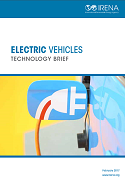Electric vehicles: technology brief
 The global stock of electric vehicles (EVs) reached 1 million in 2015 and exceeded 2 million by the end of 2016. Yet faster growth is needed for EVs to fulfil their role in the global energy transition, both through lowering vehicle emissions and boosting renewable energy use. This brief outlines the technological and policy advances still needed for EVs to help drive the transition to a sustainable global energy future. Increasing reliance on EV batteries and charging stations would support higher shares of solar and wind power, the key variable renewable energy (VRE) sources expected to be prominent in future power grids. Transport accounts for about 30% of global energy use. EVs, therefore, form a crucial part of REmap – the global roadmap from the International Renewable Energy Agency (IRENA) to double renewables in the energy mix by 2030. Global growth to 160 million EVs could support VRE-based power generation on a large scale, the analysis finds.
The global stock of electric vehicles (EVs) reached 1 million in 2015 and exceeded 2 million by the end of 2016. Yet faster growth is needed for EVs to fulfil their role in the global energy transition, both through lowering vehicle emissions and boosting renewable energy use. This brief outlines the technological and policy advances still needed for EVs to help drive the transition to a sustainable global energy future. Increasing reliance on EV batteries and charging stations would support higher shares of solar and wind power, the key variable renewable energy (VRE) sources expected to be prominent in future power grids. Transport accounts for about 30% of global energy use. EVs, therefore, form a crucial part of REmap – the global roadmap from the International Renewable Energy Agency (IRENA) to double renewables in the energy mix by 2030. Global growth to 160 million EVs could support VRE-based power generation on a large scale, the analysis finds.
Related Content
- Electric vehicles utilization for vehicle-to-grid (V2G) services
- Reaching full charge: the need for a policy reset for India’s electric two-wheeler industry
- The role of lithium- based energy storage in India’s climate goals
- India’s EV transition: catalysing Kochi’s electric 3-wheeler market through local policy
- India’s EV transition: managing fuel tax revenue loss
- Understanding investment, trade, and battery waste management linkages for a globally competitive EV manufacturing sector
